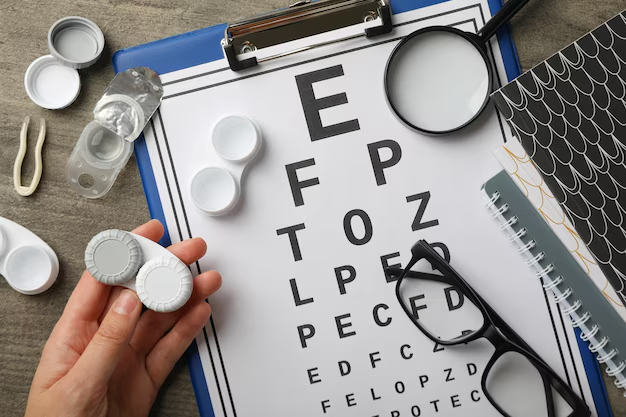Your Guide to Can Cataracts Cause Eye Floaters
What You Get:
Free Guide
Free, helpful information about Cataract FAQ and related Can Cataracts Cause Eye Floaters topics.
Helpful Information
Get clear and easy-to-understand details about Can Cataracts Cause Eye Floaters topics and resources.
Personalized Offers
Answer a few optional questions to receive offers or information related to Cataract FAQ. The survey is optional and not required to access your free guide.
Understanding Cataracts and Eye Floaters: Can One Cause the Other?
When it comes to eye health, cataracts and eye floaters are common concerns that people often face as they age. While these conditions are frequently discussed, there remains some confusion about whether they are related, or if one might cause the other. Today, let's delve into the intricacies of these two eye conditions, exploring their causes, symptoms, and intersections—and whether cataracts can indeed cause eye floaters.
🎯 What Are Cataracts?
Cataracts refer to the clouding of the eye's natural lens, which lies behind the iris and the pupil. This condition primarily affects those over the age of 40, although it can occur earlier due to genetics, injury, or certain medical conditions.
🚦 Symptoms of Cataracts
- Blurry Vision: The most common symptom, causing difficulty in reading and recognizing faces.
- Faded Colors: Colors may seem less vibrant.
- Glare Sensitivity: Increased sensitivity to light and glare, often making nighttime driving challenging.
- Double Vision: Seeing multiple images of a single object, which may resolve as the cataract progresses.
Key Takeaway: Cataracts impair vision over time, and early detection and treatment can preserve vision quality.
👀 Explaining Eye Floaters
Eye floaters are small specks or strands that drift through your field of vision. They are particularly noticeable when looking at a bright plain background, like a clear sky or a white wall.
🔍 Causes of Eye Floaters
- Aging: As people age, the vitreous—a jelly-like substance inside the eyes—tends to shrink and become more liquid, creating floaters.
- Retinal Tears: Sometimes, floaters indicate a more significant problem, such as a tear in the retina.
- Eye Injuries or Inflammation: Eye trauma or swelling can increase the incidence of floaters.
Key Takeaway: While typically harmless, a sudden increase in floaters warrants medical attention to rule out retinal issues.
🔗 The Interconnection: Cataracts and Floaters
Can Cataracts Cause Eye Floaters?
Cataracts themselves do not cause floaters as they involve the lens of the eye, whereas floaters are related to the vitreous gel. However, both conditions may co-occur in aging individuals. Cataract surgery can sometimes make existing floaters more noticeable post-operatively due to the clearer vision provided.
Expert Perspective: It's not unusual for individuals to notice floaters more after cataract surgery because their rejuvenated vision makes these minor specks more apparent.
🏥 Cataract Surgery and Eye Floaters
Cataract surgery involves replacing the clouded lens with an artificial lens. This procedure is generally safe and has high success rates.
🌟 Post-Operative Experience
- Increased Awareness: After surgery, patients often report seeing floaters more clearly due to the enhanced vision.
- Surgery Risks: Although rare, floaters can sometimes be linked to surgery-related complications, such as posterior vitreous detachment.
Important Note: Any significant changes post-surgery, like flashes of light or a shower of new floaters, should be evaluated by an ophthalmologist immediately.
📊 Visual Summary of Cataracts vs. Floaters
Here's a quick comparison between cataracts and floaters to clarify their differences:
| Aspect | Cataracts | Floaters |
|---|---|---|
| Area Affected | Lens | Vitreous gel |
| Common Age | Over 40 years | Over 40 years |
| Symptoms | Blurry vision, faded colors | Specks in vision |
| Surgery Impact | Clears vision | Makes floaters more apparent |
| Emergency Signs | Rapid changes in symptoms | Sudden flashes or many floaters |
🧩 Additional Considerations and Eye Health Tips
While cataracts and floaters are separate concerns, maintaining overall eye health can help manage these conditions more effectively.
👁️ Eye Care Tips
- Regular Eye Exams: Yearly eye exams are crucial for detecting changes early.
- Healthy Diet: Nutrients like lutein and zeaxanthin, found in leafy greens, support eye health.
- Protective Eyewear: Sunglasses can protect against harmful UV rays, slowing cataract progression.
- Manage Health Conditions: Conditions like diabetes can exacerbate eye issues, so effective management is essential.
Encouraging Insight: Prioritizing these habits fosters eye health and potentially mitigates the severity of both cataracts and floaters.
🤔 Questions to Consider for Your Eye Health Journey
- When Was Your Last Eye Exam? Regular check-ups can prevent or slow down many eye-related issues.
- Do You Use Eye Protection? Whether reading screens or outside, protecting your eyes can safeguard them from premature aging.
- Aware of Family History? Understanding genetic predispositions helps in taking preventive measures.
In understanding the distinct nature of cataracts and eye floaters, it's clear they are separate conditions often experienced concurrently, especially with age. With proactive care and timely medical consultations, managing these eye health challenges can lead to a clearer, brighter future.
Final Note: Stay informed and vigilant about changes in vision, and consult with eye care professionals for any concerns. Prioritizing eye health is essential for maintaining a quality life as you age.
What You Get:
Free Cataract FAQ Guide
Free, helpful information about Can Cataracts Cause Eye Floaters and related resources.

Helpful Information
Get clear, easy-to-understand details about Can Cataracts Cause Eye Floaters topics.

Optional Personalized Offers
Answer a few optional questions to see offers or information related to Cataract FAQ. Participation is not required to get your free guide.


